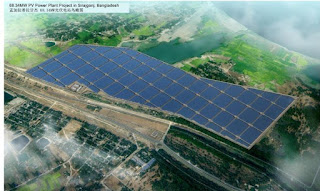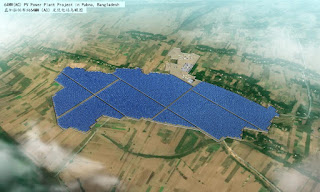On June 29, the Bangladesh Prabna 64 MW photovoltaic power station project was officially signed in Dhaka, Bangladesh, marking the official launch of the Bangladesh 500 MW renewable energy project of CMC, a subsidiary of GENERTEC.
The project is jointly invested and developed by GENERTEC CMC and North-West Power Generation Company Limited. It is the largest renewable energy project invested by a Chinese-funded enterprise in Bangladesh. The project will be constructed in stages according to the actual progress. At this stage, the 68 MW photovoltaic power station project in Sirajganj has also completed signature.
In recent years, the high cost of imported coal and natural gas has put enormous pressure on the country's finances. Therefore, Bangladesh pledged in the Nationally Determined Contribution (NDC) program completed in August last year to reach an installed capacity of 4,100 megawatts by 2030, and 40% of its electricity to come from renewable energy by 2041. In this context, the Bangladesh government vigorously promotes renewable energy generation, and the Bangladesh 500 MW renewable energy project came into being.
In 2020, on the basis of the previous good cooperation, GENERTEC CMC signed an investment agreement with North-West Power Generation Company Limited (NWPGCL), and registered and established Bangladesh-China Renewable Energy Company (Pvt.) Limited (BCRECL) in Bangladesh, planning to jointly invest and develop in Bangladesh a total capacity of 500 megawatt (AC) renewable energy (solar, wind, etc.) power plant project.
North-West Power Generation Company Limited (NWPGCL) was established in August 2007 and is headquartered in Dhaka, the capital of Bangladesh. It is a state-owned enterprise 100% controlled by the Bangladesh Power Development Board (BPDB).After the Bangladesh 500 MW renewable energy project is fully completed and put into operation, it is expected to provide Bangladesh with about 821 million kWh of clean energy every year, which is equivalent to saving about 320,000 tons of standard coal for Bangladesh and reducing carbon dioxide emissions by about 818,500 tons per year.
Bangladesh's Minister of Electricity, Energy and Mineral Resources, said the planned projects will help the government achieve its goal of 40% of electricity from renewable sources as soon as possible.
Up to now, according to the data released by the Bangladesh National Energy and Electricity Development Agency, the total installed capacity of Bangladesh is 22,348 MW, of which 777 MW comes from renewable energy, of which the installed photovoltaic capacity is 229 MW, and the installed capacity of renewable energy accounts for about 3% of the total capacity. After the project is fully completed, it will increase the proportion of renewable energy power stations in Bangladesh to 15%, making an important contribution to the adjustment of power structure and power development in Bangladesh.
At present, the sub-projects jointly promoted in the first phase of the Bangladesh 500 MW renewable energy project are the Sirajganj 68 MW photovoltaic power station project and the Pabna 64 MW photovoltaic power station project.
The Bangladesh Sirajganj 68 MW photovoltaic power station project is located in Sirajganj District in the Rajshahi district of central Bangladesh. The EPC contract was signed on February 24, 2022.
The Bangladesh Prabna 64 MW photovoltaic power station project is located in the Prabna district in the Rajshahi district of northern Bangladesh, 80 kilometers northwest of the capital Dhaka.
The total investment of the two projects is about 170 million US dollars. After the project is completed, it is expected to generate 220 million kWh of electricity annually, which will help reduce carbon dioxide emissions by about 210,000 tons per year.
As one of the important countries along the "Belt and Road" initiative and the "Bangladesh-China-India-Myanmar Economic Corridor", the power energy of Bangladesh is highly dependent on natural gas and imported diesel. The power structure is dominated by gas and oil units, and in short of renewable energy sources, such as wind power and solar photovoltaic. Under the megatrend towards green and low-carbon transformation, the country sees more and more such power plant projects utilizing green and renewable solar technologies to be realized in the near future. As a maker of photovoltaic solar panels, Greco Solar is taking the opportunities of "Belt and Road" initiative and participates in the construction and development of Bangladesh's power and energy market. It has been supplying solar modules and systems solutions with inexpensive and very affordable costs. Greco Solar is devoted to achieve mutual benefit of human, society and environment by its creativity, efficiency and value.
Bangladeshi Prime Minister Hasina said in a
signed article published in the Financial Times:
The climate crisis is such an imminent
matter that we need to see climate change, the Covid-19 pandemic and the
destruction of nature as a common threat and unite against this threat for a
common, cleaner, greener, more safe world.


No comments:
Post a Comment